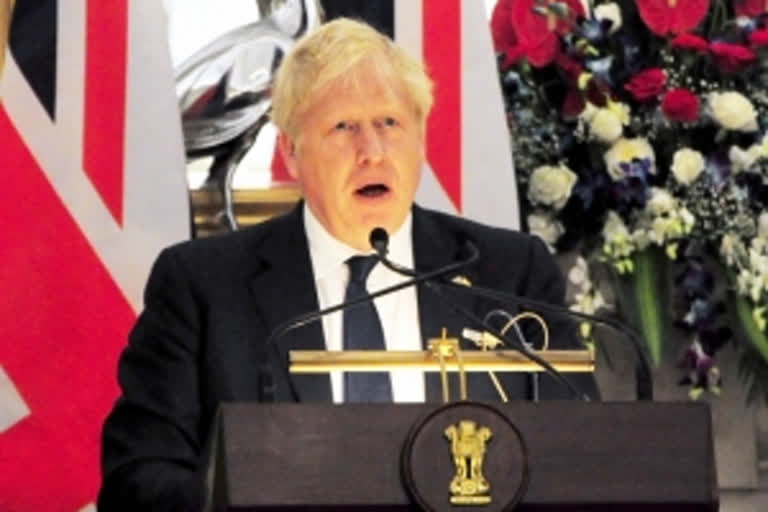New Delhi: British Prime Minister Boris Johnson on Friday said that he felt like Sachin Tendulkar upon his arrival (in Ahmedabad) and also like Amitabh Bachchan when he saw (his) hoardings everywhere during his visit to Gujarat. Addressing a joint press conference along with Prime Minister Narendra Modi at Hyderabad House here, he said he had a fantastic two-day tour of India and became the first Conservative Prime Minister who visited Gujarat on the invitation of his Khas Dost' personal friend which is the home of half of all British Indians. "I had an amazing reception, absolutely amazing," Johnson added.
Speaking on India's concerns on Khalistani elements in India Boris Johnson said that the UK does not tolerate extremist groups operating in in the country and targeting other nations. Asked about India's position on Russian aggression against Ukraine, he said, "You have to recognise that India came out strongly against what happened in Bucha." India has historic relationship with Russia and everybody respects it, he said. On India's concerns over Khalistani elements in the UK, Johnson said, "We don't tolerate extremist groups operating in UK and targeting other countries." Asked about reports of rights violations in India, Johnson said India is a great democracy and has constitutional protection.
Highlighting the growing economic cooperation with India, Boris Johnson on Friday said that he and his counterpart Narendra Modi were seeking completion of the negotiations on a Free Trade Agreement (FTA) between the two countries by October this year. "We are using our Brexit freedoms to reach a bilateral Free Trade Agreement (FTA) and today Prime Minister Modi and I told our negotiators to get it done by Diwali in October," Johnson said. "This could double our trade and investment by the end of the decade driving down prices for consumers and increasing wages across the UK by as much as three billion pounds," the UK PM added. Johnson said that in the course of his visit, India and the UK have secured new deals worth a billion pounds, creating more than 11,000 jobs.
Johnson also highlighted the importance of India as a major economy of the world as well as an important partner of the UK both in terms of economic and strategic partnerships. "India is an incredible rising power in Asia, one of the fastest-growing economies in the world, already worth 2.25 trillion pounds, and said to be the world's third-largest economy by 2050. India is also our biggest partner in the indo-pacific which is increasingly the geopolitical center of the world with two-thirds of humanity and a third of the global economy and that share is rising every year," Johnson said.
Talking about India's role in the British economy, Johnson said, "Indian investment already supports almost half a million British jobs, and with a population bigger than the US and EU combines, there is so much potential for us to take our trade and investment to a whole new level." "So, what we are getting on with here is delivering on the priorities of the British people, but also deepening our friendship with a nation with whom we have profound ties of language, culture, and kinship while making both our countries safer and our economies stronger," the British PM said. India and UK launched Free Trade Agreement negotiations in January this year. After the conclusion of two rounds of negotiations, the third round of negotiations between the two countries will begin next week. The two countries are also exploring the possibility of an interim agreement to provide quick gains for benefitting businesses on both sides.
Addressing the media after the meeting between the two leaders, Foreign Secretary Harsh Vardhan Shringla said "the issue of economic offenders was discussed during the bilateral talks". "On the issue of economic offenders, we have been pursuing this matter for some time at different levels with the UK. Our objective is to bring back those economic fugitives who are wanted in India to face justice in the country," Shringla added. The British Prime Minister inidicated that he was very sensitive to Indian concerns in this regard and that he would see what he could do, the Foreign Secretary told reporters. India has been repeatedly seeking action against pro-Pakistan Sikh radicals operating from the UK.
(With agency inputs)



